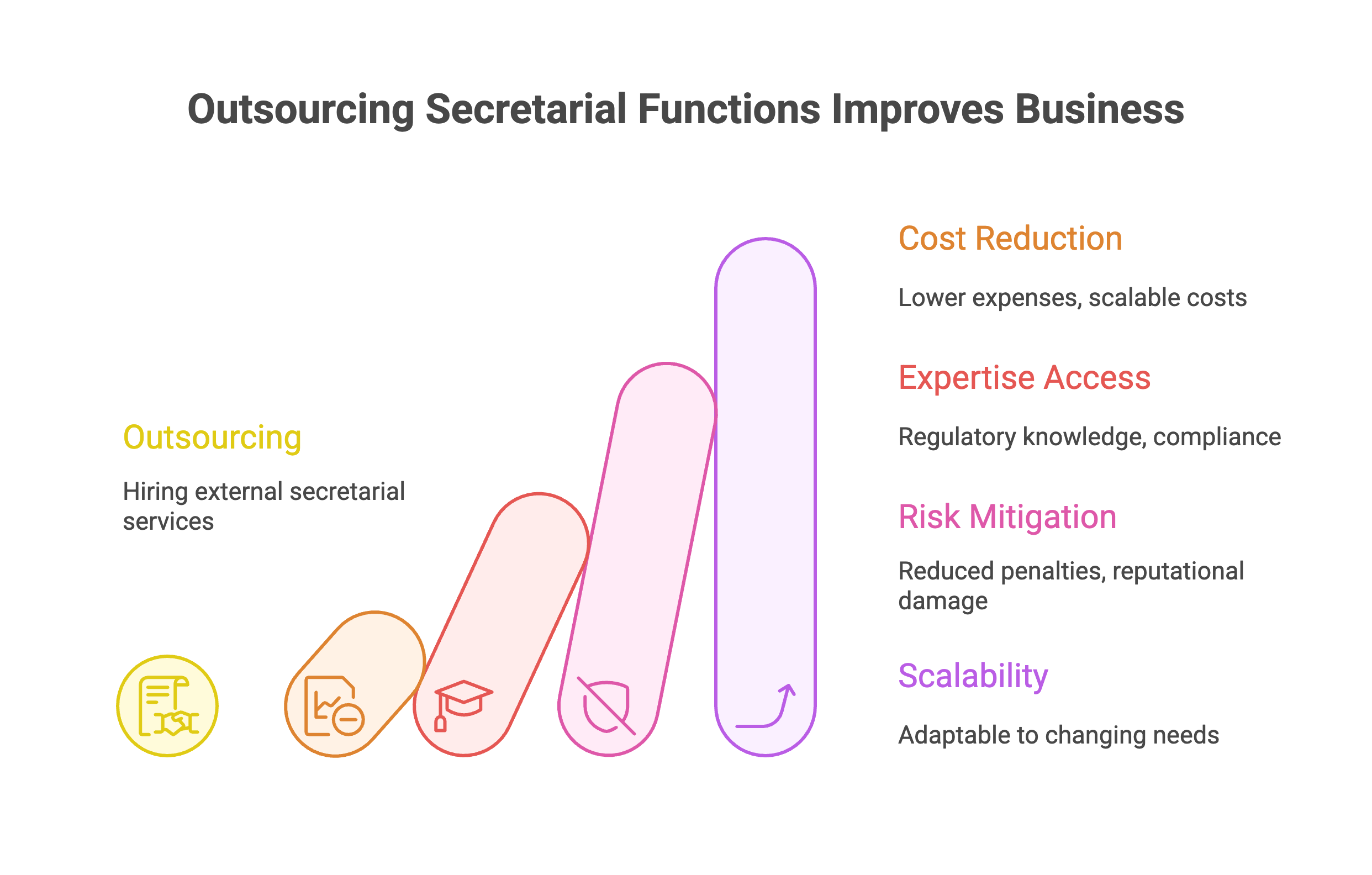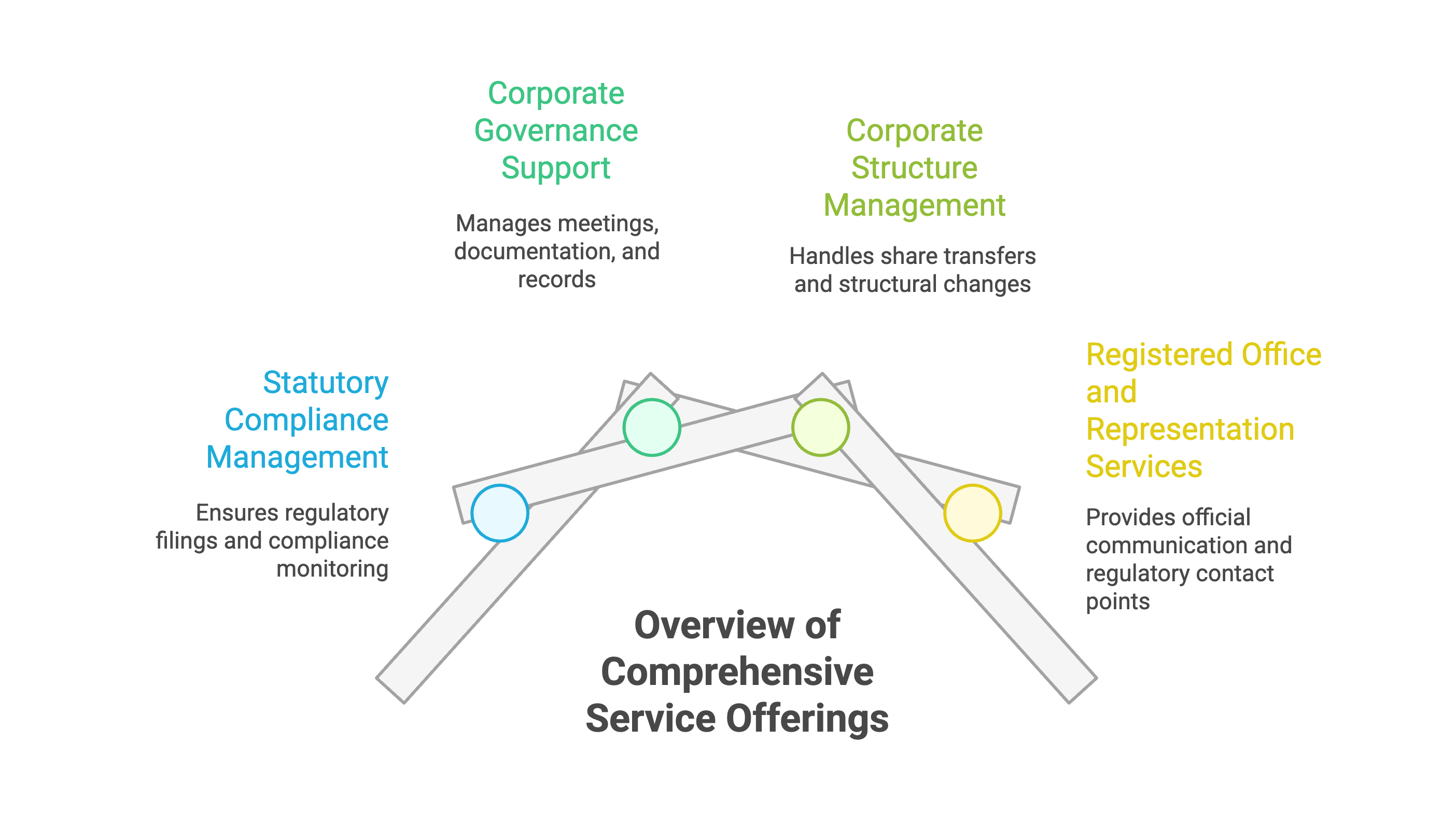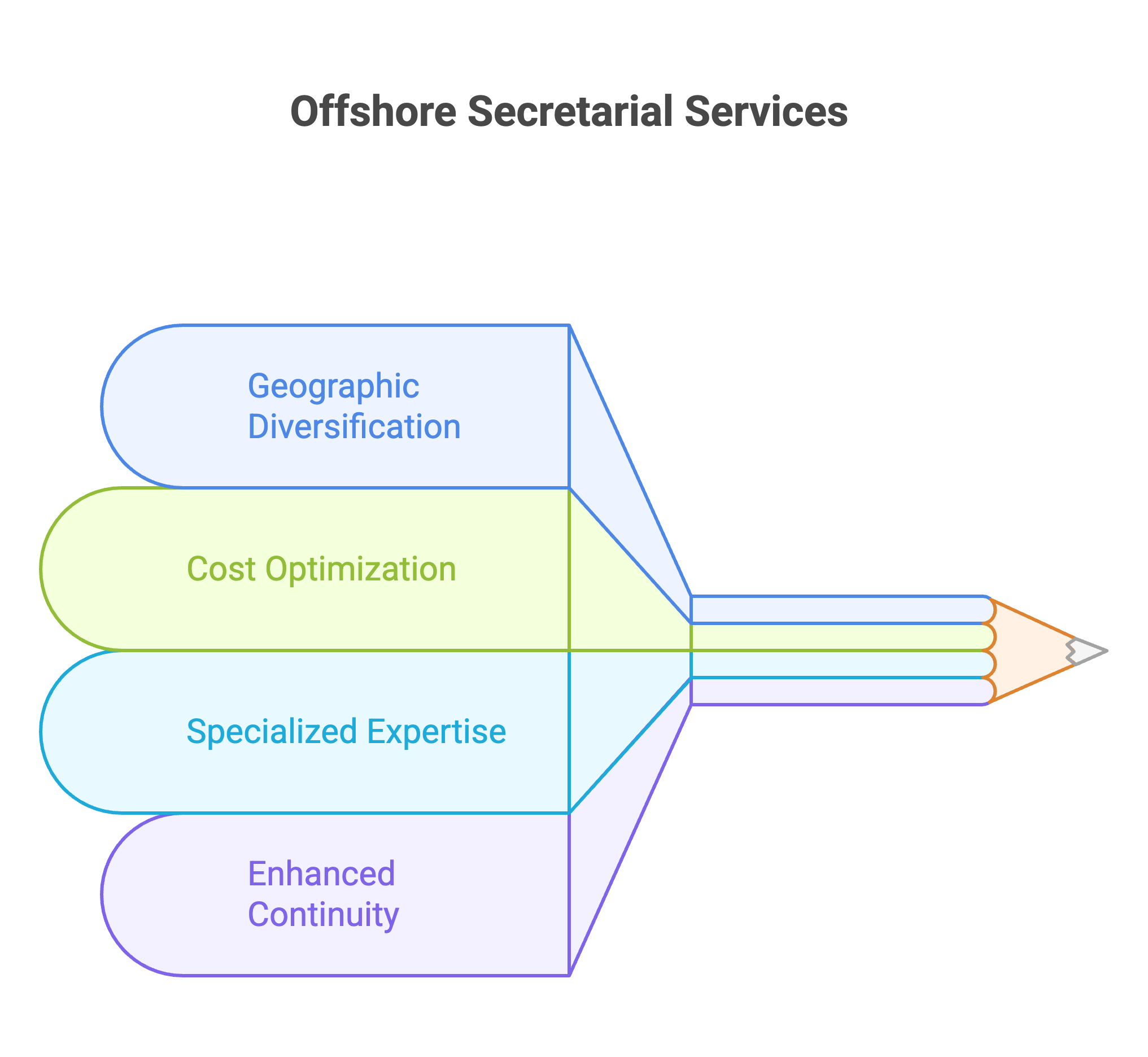Managing corporate compliance and administrative functions can overwhelm growing businesses, especially those operating across multiple jurisdictions. Outsourced secretarial services provide a strategic solution, enabling companies to maintain regulatory compliance while focusing on core business activities. This comprehensive guide explores how offshore company secretarial services can transform your business operations.
Outsourced secretarial services involve delegating corporate administrative and compliance functions to specialized external providers. Unlike basic administrative support, these services focus on critical regulatory requirements including statutory filings, corporate governance, and compliance management across multiple jurisdictions.
Core Functions Include:
These services have become essential as regulatory complexity increases globally. Following major regulatory changes and international compliance initiatives, businesses now face unprecedented administrative requirements that often exceed internal capabilities.

Outsourcing secretarial services typically reduces costs by 40-60% compared to maintaining in-house teams. Consider the total cost of internal secretarial staff: salaries ranging from $50,000-$80,000 annually, plus benefits, training, office space, and specialized software. Outsourced services convert these fixed expenses into scalable variable costs, often totaling $20,000-$35,000 for equivalent functions.
Professional secretarial service providers employ specialists with deep knowledge of regulatory frameworks across multiple jurisdictions. These experts stay current with evolving compliance requirements, ensuring your company benefits from up-to-date expertise without ongoing training investments.
Compliance failures can result in significant penalties and reputational damage. Professional providers implement robust systems specifically designed to ensure timely regulatory compliance, substantially reducing oversight risks. Many providers maintain professional indemnity insurance, offering additional protection against potential compliance errors.
Outsourced arrangements allow companies to scale services based on changing needs during expansion, restructuring, or seasonal fluctuations. This adaptability proves particularly valuable for growing businesses with evolving administrative requirements.

Professional providers handle all mandatory regulatory filings including annual returns, financial statement submissions, and regulatory notifications. They maintain compliance calendars ensuring all deadlines are met while monitoring regulatory changes that might affect your business.
Services include organizing board and shareholder meetings, preparing meeting documentation, recording minutes, and maintaining comprehensive records of corporate resolutions. This creates an essential audit trail for corporate governance activities.
Providers handle share transfers, capital restructuring, director appointments, and constitutional document amendments. They ensure all changes are properly documented, approved through appropriate corporate resolutions, and registered with relevant authorities.
Many jurisdictions require companies to maintain registered offices for official communications. Outsourced providers fulfill this requirement while managing correspondence, processing official notices, and maintaining regulatory contact points.
Offshore secretarial services enable businesses to establish corporate entities in multiple jurisdictions while centralizing administrative management. A company expanding into Singapore, Hong Kong, and the UAE can work with a single offshore provider specializing in all these jurisdictions, receiving coordinated service rather than managing multiple local providers.
Offshore providers often operate in cost-efficient jurisdictions while maintaining high service quality. Professional secretarial services in major financial centers typically cost 40-60% more than equivalent services from reputable offshore providers in locations like Singapore, Hong Kong, or Dubai.
Offshore secretarial firms routinely handle complex cross-border arrangements, applying extensive experience to help clients create efficient and compliant international corporate structures. Their expertise extends to navigating complex transactions, restructuring international groups, and establishing entities for specific purposes.
Geographic diversification of administrative functions creates natural resilience against localized disruptions. Offshore providers typically implement robust business continuity measures, including data backup systems and crisis management protocols.

Choose providers with demonstrated expertise in regions where your business operates or plans to expand. Verify their understanding of specific regulatory frameworks and request examples of successful client support in similar situations.
Key Evaluation Criteria:
Compile a detailed inventory of your specific secretarial needs and match these against provider offerings. Ensure they can deliver comprehensive coverage without significant gaps and scale services as your business grows.
Given the sensitive nature of corporate documentation, evaluate providers' information security frameworks including:
Begin with a comprehensive internal assessment documenting current processes, pain points, and specific objectives for outsourcing. Establish measurable goals such as compliance improvement targets or cost reduction objectives.
Develop a detailed transition plan including:
Schedule dedicated sessions covering company history, corporate structure nuances, and jurisdiction-specific requirements. Document unusual aspects of your corporate structure and provide comprehensive background on past regulatory interactions.
Create clear communication channels including designated points of contact, response time expectations, and escalation procedures. Implement regular structured communication through scheduled conferences and status reports.
Establish governance frameworks with clearly defined roles and responsibilities. Implement service level agreements defining performance expectations and accountability mechanisms. Conduct regular performance reviews and maintain continuous improvement processes.
Address potential barriers through clear communication protocols, standardized terminology, and regular relationship-building activities. Foster partnership mentality rather than purely transactional relationships.
Implement tiered review processes for critical documents, establish clear quality standards, and conduct periodic audits of secretarial work. Create feedback mechanisms for promptly addressing quality issues.
Designate internal relationship managers with sufficient authority to oversee outsourced functions effectively. Balance appropriate oversight with operational efficiency to maximize outsourcing benefits.
Outsourced secretarial services typically use various pricing approaches:
Beyond direct cost savings, consider additional benefits including:
The industry continues evolving with several key trends:
Technology Integration: Advanced platforms providing real-time visibility into compliance status and automated workflow management.
Regulatory Complexity: Increasing international coordination requiring specialized expertise in global compliance frameworks.
Digital Transformation: Streamlined processes through digital document management and electronic filing systems.
ESG Compliance: Growing requirements for environmental, social, and governance reporting requiring specialized knowledge.
Outsourced secretarial services represent a strategic investment delivering measurable returns through improved compliance, cost efficiency, and operational focus. The key is engaging these services strategically rather than reactively.
Consider conducting a detailed assessment of your current secretarial functions, identifying opportunities where outsourcing could deliver meaningful improvements. Whether you're a startup establishing proper governance, a growing business scaling efficiently, or an established enterprise optimizing operations, outsourced secretarial services offer strategic advantages worth serious consideration.
Outsourced secretarial services provide essential support for businesses navigating complex regulatory environments. By transferring administrative and compliance functions to specialized providers, companies can maintain impeccable corporate standing while focusing internal resources on strategic growth initiatives.
The most successful implementations combine careful provider selection, thorough transition planning, effective governance mechanisms, and commitment to continuous improvement. This creates a foundation for sustained compliance excellence and operational efficiency that supports long-term business success.
As regulatory complexity continues increasing globally, organizations that leverage specialized secretarial expertise maintain significant advantages over those relying solely on internal resources. The investment in professional secretarial services delivers returns through reduced compliance risks, improved operational efficiency, and enhanced strategic focus on core business activities.

A practical comparison of hiring a freelancer vs using a dedicated offshore accounting team, focusing on continuity, quality control, security, and scaling.

How CPA firms outsource payroll and 1099 work to reduce penalties and admin load, with a clean workflow for approvals, filings, and year-end reporting.

Practical do's and don'ts for CPA firms outsourcing accounting work, based on common failure points and what successful rollouts do differently.